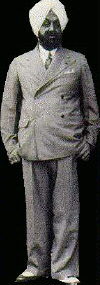Information
Title : Maharajah
Race : Sidhu Jat
Religion : Sikh
Size : 5,932 square miles
Gun Salute : 17
Under British rule this was the most important Sikh state.
The ruling families of Patiala, Nabha, Jind, Faridkot, Kaithal and Malaud all claim to be descended from the Raja of Jaisalamer. Phool the founder of this family along with his brother Sandaali became an orphans in 1618, and both were taken under the wing of their uncle. They both visited Guru Har Rai as youngsters along with their uncle, it is said that their uncle told them to rap their bellies to indiacte to the Guru the povety and hunger they were enduring. The Guru blessed Phool and is said to have told him that he would make a king.
Phool set up his own village and was often in conflict with local chiefs. This enraged the Governor of Sirhind who summoned him and put him behind bars. Phool died in 1652. He had 6 sons, of whom Rama emerged from this group as the most emininent.The Governor of Sirhind appointed Rama to the post of Chaudari. Rama was killed at Maler-Kotla in 1714. He was suceeded by his son, Ala Singh.
Sardar Ala Singh joined the Sikh fold in 1735 at the hands of Nawab Kapur Singh. He joined the Sikh forces and gained considerabally from this in the terms of wealth and terrritory. In 1752, a General of Ala Singh, Sardar Gurbaksh Singh Kaleka won possesion of eighty four village, one of which was Patiala. The Afghan Ahmad Shah Abdali conferred the title of Maharajah on Ala Singh during the formers eighth invasion between 1764 & 1765. The teritory of Patiala continued to grow right up to the death of Maharajah Ala Singh on August, 22nd 1765. He was succeeded by his only legitamete son, Amar Singh.
Amar Singh continued to use other Sikh leaders to further his aims. He continued to extend his territory. In 1767 during Abdalis 9th invasion of India, Amar Singh paid a sum of 2 lakh rupees to set thirty thousand Indians captured by Abdali as slaves free. For this benevolent act he was given the name of Bhandi Chhor (Liberator of the slaves)
Maharajah Amar Singh died in February, 1781. His son, Sahib Singh succeeded him at the tender age of seven. Sahib Singh was a very weak figure and was oudone by his sister Sahib Kaur on the battlefields. Maharajah Sahib Singh died on March 26th 1813. His eldest son, Karam Singh succeeded him. Karam Singh helped the British during the war against the Gurkhas in 1814 and during the first Sikh War in 1845. He died on December, 23rd 1845 and was succeded by his son Narinder Singh.
The great granson of Narinder Singh, Maharajah Bhupinder Singh was one of the best known Indian Maharajahs during the 20th century. He came to the throne at the age of eight in 1900. There are many stories about his extraordinary wealth and the unique class that made him distinct from all the other Indian Maharajahs. He was a regular visitor in Eurpoe and would buy the contents of stores in minutes. He was well known in London and he usually stayed at the Savoy where he would book th whole of the 2nd floor. He would be driven in a motorcade of 20 Rolls Royce cars. He died in 1938 and was suceeded by his son, Maharajah Sir Yadvinder Singh on March 23rd, 1938.
Patiala signed its teritory over to the Indian union on May 5th, 1948. Maharajah Sir Yadvinder Singh was given the title of Rajparmukh of the newly created Indian state of PEPSU. He was allowed a privy purse of 17 Lakh rupees for his upkeep and allowed to retain control over all his personal property.
|
![]()
![]()
![]()
![]()
![]()
![]()
![]()
![]()

























